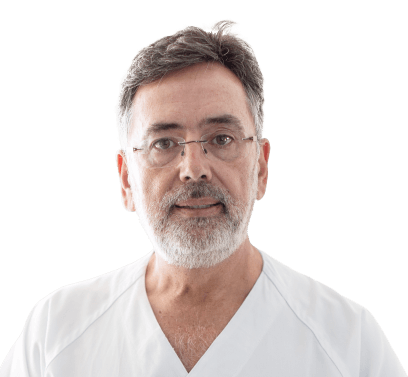Protecting your eye health | What is important – BAYER

Is caring for vision health the responsibility of an ophthalmologist? An affirmative answer may be interpreted as simplifying the division of medicine into specializations. The correct answer in our time would be: “Yes, but not only.” The ophthalmologist is still a central figure, but he is not the only healthcare provider who cares for our eyes: today we are moving to a model in which other specialists also play an important role.
This is a so-called interdisciplinary approach, including primary and hospital care, “so that together we can act in a coordinated manner and offer the best care for patients,” explains Dr. Francisco Cabrera, head of the department of ophthalmology. Hospital complex of the island of mother and child in Gran Canaria. Improved care means that in the Autonomous Community, where diabetes rates are higher than the national average, “there are almost no cases of secondary blindness caused by the disease,” he explains.
It wasn’t something improvised. In 2008, the Canarian Health Service launched the Retisalud project. The goal of the study was the early detection of diabetic retinopathy, one of the leading causes of blindness in adults. “Usually this disease is diagnosed in late stages, often irreversible, but it is known that if it is detected in the initial stages, treatment can be started and its progression can be prevented. So the key was to screen the population at risk, that is, patients with diabetes,” says Cabrera.
Protecting your eye health FAMILY DOCTOR
Primary care is the gateway to the healthcare system and the ideal way to discover whether patients with diabetes have retinal visual changes. The family doctor evaluates the retinographs and, if pathology is present, refers the patient for inpatient monitoring.
Photo: Quique Curbelo

Dr. Alicia Gonzalez Sanso
Family doctor at the Escaleritas Medical Center in Las Palmas de Gran Canaria
Photo: Quique Curbelo
Retisalud’s pioneering project included a primary care system, “which is the gateway to the health care system and makes it easier to identify these patients,” says Dr. Cabrera. It was not only about this identification, but also about the first vision assessment. For this reason, all major areas of health care were gradually provided with an important instrument, the retinograph, which until then had been used only for ophthalmic services.
At first there was reluctance, admits Dr. Alicia Gonzalez Sanso, a family physician at the Escaleritas Medical Center in Las Palmas de Gran Canaria. “Ophthalmologists were doing this, and at first we saw it as just another workload. Today we have fully integrated it into our service portfolio.”
The process, he explains, consists of two stages: first, identifying and recruiting at-risk patients; secondly, an eye examination using a retinograph. “35% of people with diabetes have visual changes in the retina; If we diagnose them early, they will not develop severe vision deficits. It’s about informing them and asking for that assessment,” he adds.
Protecting your eye health PRIMARY MEDICAL CARE
Nurses carry out the process of recruiting and finding patients with diabetes, both to inform them about the retinopathy program and to monitor them continuously and ensure periodic testing.
Photo: Quique Curbelo

Kira Mesa
Nurse at the Escaleritas Medical Center in Las Palmas de Gran Canaria.
Photo: Quique Curbelo
The role of nursing in the process of providing patient care is very important. “When a patient with diabetes comes to us for consultation, we always check whether they have already had a retinal examination; If not, we ask for it,” explains Kira Mesa, a nurse at the same health center. “In other cases, when patients don’t show up, we look for them.” The technical area gives us lists with a diabetes map, and there we see who has not been tested and contact them.”
This is followed by a retinography, which is performed by nursing technical assistants. “If a patient needs pupil dilation, the nurse will take care of it per protocol. Once the test is completed, the image is evaluated by a physician,” Mesa adds.
Protecting your eye health OPHTHALMOLOGY
The ophthalmologist evaluates cases of possible diabetic retinopathy that are referred to him in the primary care department and, depending on the stage of the disease, determines the course of action that should be followed with each patient.
Photo: Quique Curbelo

Dr. Francisco Cabrera
Head of the Department of Ophthalmology, Hospital Complex of the Mother and Child Island of Gran Canaria
Photo: Quique Curbelo
Every morning, Dr. Gonzalez Sanso checks his inbox for upcoming retinograms. “We are trained and accredited to carry out this assessment. If there is no doubt and everything is in order, the patient is scheduled for a new examination in one to two years. If I have any questions, I contact an ophthalmologist online for an evaluation. This is a way to continue to improve our training.”
In cases where lesions are observed that suggest retinopathy, it is time to schedule the patient for a follow-up examination with an ophthalmologist. So, explains Dr. Cabrera, “we evaluate you, and if we see that you require intravitreal treatment, we coordinate with the hospital pharmacy, another specialty that has a fundamental role and with which we must be in close contact.” “
Protecting your eye health HOSPITAL PHARMACY
Patients with conditions such as diabetic retinopathy or age-related macular degeneration (AMD) will require intravitreal treatment. These highly controlled medications are dispensed through the hospital pharmacy. Close collaboration between this service and the ophthalmology service is essential.
Photo: Quique Curbelo

Cristina L. Crespo (left) and Aranzazo Velas Suarez
Manager of the hospital pharmacy of the Mother and Child Island Complex in Gran Canaria and pharmacist of this department
Photo: Quique Curbelo
Treatment of eye pathologies such as diabetic retinopathy and one of its most serious complications, diabetic macular edema or age-related macular degeneration (AMD), usually requires intravitreal injections. “They are intended for use in hospitals and require careful monitoring,” explains Velas Suárez, director of the hospital pharmacy of the Insular University Hospital Complex of Mother and Child.
The specialist recalls that in the Canary Islands the prevalence of diabetes is very high, “as are eye pathologies secondary to this disease. “Ophthalmologists prescribe treatments at a certain frequency, and daily procedures are reviewed in the department.”
“The workload is increasing,” said Cristina L. Crespo, a pharmacist for the department. “In recent years, the number of patients treated has increased, currently ranging from 40 to 60 per day, as has pharmaceutical care in this area. This is why it is important that there is good communication with the service manager as well as the prescribers to speed up the process and resolve any issues or incidents that may arise without delay.”
Between them, diabetes-related blindness is virtually a thing of the past, Dr. Cabrera concludes. “With the help of Retisalud, almost 70% of the population suffering from diabetes was tested. Ophthalmologists deal only with cases in which there is pathology. We are also currently in the development stage software “Reading and Interpretation Using Artificial Intelligence to Reduce Pressure on Primary Care Physicians.”
